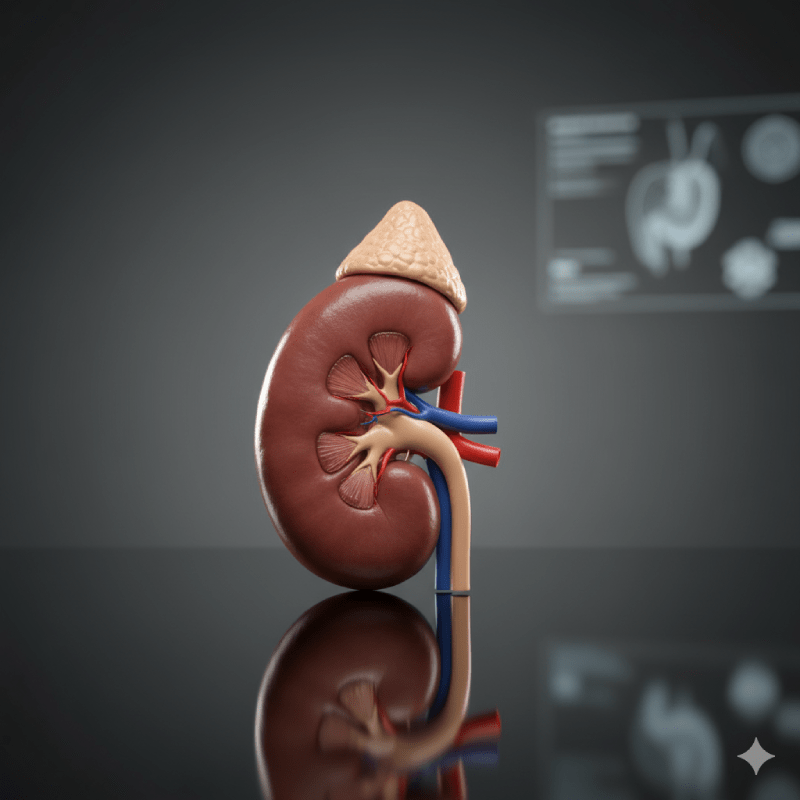Is Kidney Transplant Legally Permitted in Turkey?
Yes, kidney transplant is a legally permitted medical procedure in Turkey and is strictly supervised by the Ministry of Health. This process is regulated by Law No. 2238 on “The Law on the Acquisition, Storage, Grafting, and Transplantation of Organs and Tissues.” The law places both living and deceased organ donation and transplant procedures within an ethical and legal framework. The aim is to encourage organ donation, ensure the safety of transplant procedures, and prevent crimes such as illegal organ trafficking. Therefore, all transplant centers are subject to the ministry’s permission.
What Are the Legal Conditions for a Live Donor Kidney Transplant?
Live donor kidney transplantation is subject to strict rules determined within the scope of the “Regulation on Organ and Tissue Transplant Services.” Legally, the donor must be over 18 years old and of sound mind. Most importantly, the donor must have a written statement showing that they are donating their organ voluntarily and without any financial gain. This statement is confirmed before an ethics committee and with official documents. The donor’s general health condition must also be suitable for the transplant.
Is Organ Transplant Between Relatives Legal?
Yes, according to the law, kidney transplantation between relatives up to the fourth degree is possible, and there is no legal obstacle. The degree of kinship is determined by blood or marriage ties, and this must be proven with official documents (e.g., population registration records). This rule was introduced to prevent the commercial use of the organ and to facilitate the transplant procedure in cases where the donor has a strong psychological bond. The ethics committees meticulously examine this kinship.
Under What Conditions Can a Non-Relative Live Donor Transplant Be Performed?
Transplants from a non-relative live donor are subject to very strict legal conditions and are generally considered a last resort. For such transplants to be performed, both the recipient and the donor must prove why they want a non-relative transplant. These procedures are examined in detail by the Ethics Committee within the hospital. The committee verifies why the donor and recipient have chosen each other, whether there is any commercial connection between them, and that this decision was made entirely voluntarily and within ethical boundaries.
Is It Legal to Buy or Sell a Kidney?
No, in Turkey and internationally, it is strictly forbidden and a serious crime to buy or sell any organ, including a kidney. The organ transplant law includes strict rules to prevent organ trafficking and prescribes imprisonment for those who commit this crime. The fundamental principle adopted in the laws is that the organ must be donated voluntarily and without any financial gain. This rule is indispensable for the protection of human health and for prioritizing ethical values.
Under What Conditions Can an Organ Transplant Be Legally Rejected?
A kidney transplant application can be rejected for various legal and medical reasons. For example, if the donor or recipient does not meet the necessary health conditions for an organ transplant, if the donor is not of sound mind, or if there are doubts that the organ was donated voluntarily, the procedure is rejected. In addition, an unfavorable opinion from the ethics committee in non-relative transplants or the slightest suspicion of organ trafficking is a sufficient reason to stop the transplant procedure.
How Does the Transplant Process Legally Work for Foreign Patients?
Foreign patients must follow certain legal procedures to have a kidney transplant in Turkey. Generally, the transplant procedure is performed with a live donor brought by the patient from their own country. In this case, both the patient and the donor must have completed the legal processes in their own countries. In addition, it is mandatory for the donor and recipient to obtain the necessary visas and residence permits to stay in Turkey legally. It is generally not legal to use a Turkish donor, and strict rules are applied in this regard to prevent organ trafficking.
Is It Legal to Have a Transplant from a Foreign Donor?
Yes, according to the law, it is possible to have a transplant from a foreign donor, but there are some important conditions. The donor and recipient must prove that they have acted in accordance with the legal organ donation rules in their own countries. In addition, documents must be submitted stating that the donor is donating the organ entirely voluntarily and without expecting any compensation. Before the transplant, the ethics committee within the hospital examines all these documents and the process in detail to approve its legal compliance.
What Is the Legal Role of Ethics Committees in the Transplant Process?
Ethics committees are a legal requirement and play a vital role in the kidney transplant process. Especially in cases such as non-relative or paired exchange transplants, the committee examines the situation of the donor and recipient in detail to evaluate the transplant’s ethical and legal compliance. The committee’s primary duty is to prevent organ trafficking and to confirm that the donor’s decision was made with complete free will. It is not legally possible to perform a transplant without the approval of the ethics committee.

Why Is Written Consent a Legal Requirement for Organ Transplants?
Obtaining written consent for an organ transplant is a legal requirement that protects the rights of both the donor and the recipient. This consent shows that the donor is making the organ donation consciously, with free will, and without any pressure. In addition, the recipient also declares that they fully understand the risks and benefits of the operation. These documents ensure the transparency and legality of the transplant process and prevent any potential legal problems in the future.
What Crimes Does the Organ Transplant Law Cover?
The organ transplant law covers various crimes related to organ donation and transplantation. The main one is organ trafficking, which is the buying and selling of organs for money or other consideration. Also, forcing, threatening, or deceiving a person to donate an organ is a crime according to the law. Heavy penalties are applied to those who commit these crimes under the organ transplant law, which ensures that the process remains within an ethical and legal framework.
How Many Times Can a Person Legally Donate an Organ?
Legally, a person can donate only one kidney or a part of their liver while they are alive. This is a rule put in place to protect the donor’s health. It is not legally possible to donate more than one organ, as this can cause serious harm to the donor’s health. This rule ensures that organ donation remains an act of sacrifice and that the donor’s quality of life is not negatively affected.
What Is the Legal Procedure for a Deceased Donor Transplant?
Deceased donor organ transplantation is subject to a specific procedure legally and within the framework of ethical rules. First, a team authorized by the Ministry of Health must determine that the person’s brain death has occurred. Then, it is determined whether the person had donated their organs while alive or if their family gives consent. The legal procedures guarantee that the organ is transplanted to a patient fairly and according to medical urgency rules. Strict audits are performed to prevent the commercial use of the organ.
By Whom Is Brain Death Legally Declared?
Brain death is the most critical legal stage in determining whether a patient’s organs are suitable for a transplant. According to the law, a diagnosis of brain death is made by a board consisting of at least two neurologists, a neurosurgeon, or an anesthesiologist. This board is required to confirm brain death independently and according to scientific criteria. Brain death indicates that the person is in a medically irreversible coma and that all brain functions have completely ceased.
What Are the Legal Powers of Organ Transplant Coordinators?
Organ transplant coordinators are important professionals who manage the legal and ethical aspects of the transplant process. Coordinators are responsible for finding donor candidates, ensuring communication between the donor and recipient, collecting the necessary legal documents, and following up on the ethics committee process. Their legal powers require them to act in accordance with the laws and regulations related to organ donation and transplantation. Individuals in this position protect patient rights and ensure compliance with the law.
Is It Legally Possible to Withdraw from Organ Donation?
Yes, according to the law, a person who decides to donate an organ can withdraw from this decision at any time before the transplant surgery and without giving any reason. This is a fundamental principle that protects the donor’s free will and rights. The decision to withdraw from the donation does not result in any legal sanctions or penalties. The hospital’s ethics committee and the transplant team are obligated to respect the donor’s decision and stop the process immediately.
How Are Transplant Centers in Turkey Legally Monitored?
All organ transplant centers in Turkey are regularly monitored by the Ministry of Health. These audits are carried out to confirm that the transplant procedures are performed in accordance with laws, ethical rules, and medical standards. During the audits, the hospital’s technological infrastructure, the competence of the surgeons, patient records, and donor-recipient matching processes are checked. Heavy penalties, such as the suspension of activities or the revocation of authorization documents, can be applied to centers that do not comply with the law.
What Is the Relationship Between the Organ Transplant Law and Patient Rights?
The organ transplant law contains a series of rules designed to protect patient rights. The law guarantees the right of patients and donors to give informed consent. This shows that both parties fully understand the risks, benefits, and possible outcomes of the operation and that they have made this decision with their free will. In addition, the rights of patients to have their privacy protected, not to be discriminated against, and to receive the best medical service during the treatment process are also guaranteed by this law.
How Does the Legal Follow-up Process Work After an Organ Transplant?
After a kidney transplant surgery, hospitals and transplant centers are obligated to regularly report data to the Ministry of Health. These reports contain information about the success of the transplant, the health status of the patient and donor, and potential complications. Legal follow-up is important for both monitoring the quality of the treatment and detecting possible illegal activities. This process helps monitor the long-term health of the donor and recipient and collect data for future treatments.
How Should Media and Legally Reporting on Organ Transplants Be Done?
Organ transplantation is a topic that causes great sensitivity in the public, and it is mandatory to comply with legal and ethical rules when it is reported by the media. According to the law, it is forbidden to present organ donation or transplant as a means of money or fame. The media must keep the identities of the donor or recipient confidential and present the organ donation process in a truthful, transparent, and ethical manner. False or misleading news can lead to legal sanctions.
What Are the Legal Responsibilities of Hospitals and Surgeons?
Hospitals and surgeons who perform kidney transplants have a series of legal responsibilities. The hospital is obligated to act in accordance with legal procedures and medical standards at all stages of the transplant procedure. Surgeons are responsible for performing the operation at the highest medical and ethical standards and for making every effort for the well-being of the patient. In the event of any medical error or legal violation, surgeons and the hospital can be held legally responsible.
What Are the Legally Required Documents for an Organ Transplant?
For a kidney transplant procedure, a large number of documents must be prepared legally. These documents include the identity documents of the donor and recipient, population registration records showing the kinship, a notarized document showing that the donor is a volunteer, psychological evaluation reports, and medical test results. For foreign patients, international documents such as visas and residence permits are also required in addition to these documents. All these documents ensure the transparency of the legal process.
Is Paired Exchange Legally Possible?
Yes, paired exchange is legally possible in Turkey and is becoming more common. Paired exchange involves two donor-recipient pairs who cannot have a transplant due to blood type or tissue incompatibility exchanging kidneys with each other’s donors. This procedure is meticulously examined by ethics committees, and it is a legal requirement that the transplants are performed simultaneously. This prevents ethical problems that may arise if the donor withdraws from the decision.

Do the Legal Regulations in Turkey Comply with International Standards?
Turkey’s legal regulations in the field of organ transplantation fully comply with international standards and ethical rules. Turkey has adopted the principles determined by international organ transplant organizations such as the World Health Organization and the Declaration of Istanbul. This ensures that kidney transplants performed in Turkey are recognized and considered reliable internationally. The legal framework aims to reduce organ trafficking to zero and to guarantee the voluntariness of donations.
What Are the Legal Guarantees of Voluntary Donation?
Voluntary donation is one of the main pillars of the organ transplant law, and various legal guarantees exist to protect this principle. It must be documented that the donor is not under any pressure, coercion, or financial gain to donate their organ. This is ensured through psychological evaluations and statements made in the presence of a notary. In addition, the donor’s right to withdraw from their decision at any time is also legally protected.
Is the Fee for Kidney Transplant Legally Determined?
The fee charged for an organ transplant in Turkey is not the price of the kidney. It is the cost of the services provided by the hospital and the surgical team for the transplant procedure. According to the law, a fee cannot be charged for the organ itself in any way. The prices offered cover expenses such as surgery costs, hospital stay, medical supplies, and medications. Pricing can vary according to each hospital’s and clinic’s own policy, but it is absolutely forbidden to invoice for the organ itself.
What Is the Purpose of the Organ Donation Card According to the Law?
The organ donation card is a legal document that shows a person’s desire to donate their organs while they are alive. This card declares that the person’s organs can be donated in the event of possible brain death. The legal validity of the card is supported by the decision of the person’s family. According to the law, the organs of a person with a card cannot be taken without the consent of their family. This card allows the person to legally express their will and encourages organ donation.
Is Post-Transplant Follow-up Legally Mandatory?
Yes, it is a legal requirement for the patient and donor to be regularly followed up after a kidney transplant. Transplant centers are obligated to report the health status and recovery processes of the patient and donor to the Ministry of Health. This follow-up is important for ensuring the long-term success of the transplant and for early diagnosis of potential complications. In addition, this data is used for scientific research in the field of organ transplantation.
Is Organ Transplant Legally Possible for Children?
Yes, organ transplant is legally possible for children. Organ transplants in patients under 18 are much more strictly supervised according to laws and ethical rules. Live donor transplants are usually preferred for child patients. The consent of the family and the approval of the ethics committee are obtained for the donor to donate the organ. The legal procedures ensure that the child receives the best medical and ethical service and that the transplant procedure is the most suitable option for the child’s health.
How Is Patient Confidentiality Protected According to the Law?
The organ transplant law protects the confidentiality of both the donor and the recipient at the highest level. The identity information of the donor and recipient is kept confidential legally and within the framework of ethical rules. This is of vital importance to ensure patient-doctor trust and to prevent any discrimination or commercial activity. The transplant center is legally obligated to protect this confidentiality, and the violation of this rule can lead to legal sanctions.
Under What Conditions Is a Deceased Donor Transplant Legally Rejected?
A deceased donor transplant can be rejected for some legal and medical reasons. For example, if the donated organ is not suitable for the recipient (tissue or blood type incompatibility), if the quality of the organ is low, or if the recipient’s general health condition is not suitable for the transplant, the transplant is rejected. Legally, all these decisions must be based on scientific and ethical criteria to protect the patient’s health and prevent the failure of the transplant procedure.
Does a Patient Have the Legal Right to Withdraw from Treatment?
Yes, like any patient, patients waiting in line for a kidney transplant also have the right to withdraw from treatment at any time during the treatment process. This decision is entirely up to the patient’s own free will, and there is no legal sanction. A patient who withdraws from treatment is removed from the waiting list, and this decision is noted in their medical records. This is a fundamental legal right that protects patient autonomy.
What Is the Legal Age of Consent for Organ Transplant?
In Turkey, the legal age of consent for live donor organ donation is 18. This means that a person must be legally an adult to decide to donate their organ. Individuals under 18 cannot legally donate their own organs. This rule was put in place to protect children and young people from potential risks and to ensure that the organ donation decision is made with full maturity.
According to the Law, Who Determines Where the Organ Will Be Transplanted?
According to the law, where the organ will be transplanted is determined by transplant centers authorized by the Ministry of Health. The patient can choose from among these centers. The transplant center makes a plan based on criteria such as the patient’s medical condition, waiting time, and donor-recipient compatibility. This process, in accordance with the law, guarantees that the patient will receive the best medical service and that the procedure will be performed in a center where it can be successful.
What Happens If an Illegal Transplant Is Performed?
Performing an illegal organ transplant in Turkey leads to serious legal consequences. Transplants performed without following legal procedures can fall under the crime of organ trafficking. In such a procedure, both surgeons and the patient and donor can face heavy legal sanctions such as imprisonment. Illegal transplants can cause serious harm to the patient’s health and lead to a complete violation of ethical values.
What Are the Legal Sanctions for the Crime of Organ Trafficking?
The crime of organ trafficking is subject to serious legal sanctions in the Turkish Penal Code and the Organ Transplant Law. Those who commit this crime can be punished with both a fine and long-term imprisonment. The legal sanctions aim to prevent organ trafficking, deter the commission of such crimes, and ensure that the organ donation process is completely transparent and ethical. Providing any financial benefit in exchange for the organ constitutes this crime.
Can Intermediaries Be Legally Used in the Transplant Procedure?
Using an intermediary or broker in the transplant procedure is not legal and is considered a crime of organ trafficking. The transplant process requires a direct and ethical relationship between the patient and the donor. According to the law, it is forbidden for intermediaries to demand money with the promise of finding an organ or speeding up the transplant process. Such activities can be part of illegal organ trafficking networks. Therefore, all transplant procedures must be done directly through authorized transplant centers.



